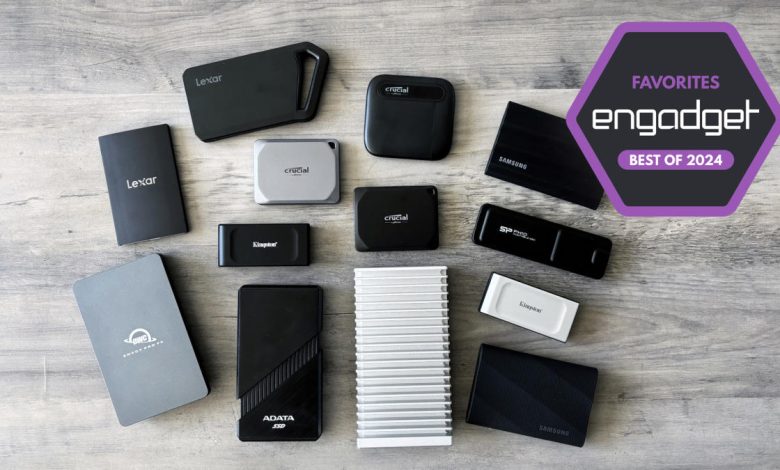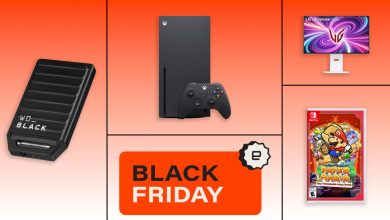The best portable SSDs for 2024

If you wish to again up useful knowledge out of your PC, switch movies to a Mac or offload a number of video games out of your sport console, a very good exterior SSD might help. These tiny bricks might price greater than a standard transportable laborious drive, however they’re noticeably quicker, smaller and much more dependable in the long run. That mentioned, figuring out one of the best exterior SSD for you isn’t so simple as choosing the one which’s priced the bottom or packs probably the most area. (At the least, it shouldn’t be.) Should you’re trying so as to add some transportable storage to your desktop or on a regular basis carry, we’ve spent months weeding by way of the exterior solid-state drive market, testing a number of contenders and checking out which of them ship probably the most worth. You’ll find our favorites, plus a fast rundown of what to know earlier than shopping for considered one of this stuff, under.
Desk of contents
Finest exterior SSDs for 2024
Photograph by Jeff Dunn / Engadget
Capacities: 1TB, 2TB, 4TB | Dimension: 2.56 x 1.97 x 0.39 inches | Weight: 1.34 ounces | USB interface: USB 3.2 Gen 2 | Controller/bridge chip: Silicon Movement SM2320 | NAND kind: TLC | Rated most sequential speeds: 1,050 MB/s learn, 1,050 MB/s write | Guarantee: 5 years
The Essential X9 Professional completed at or simply below the highest in every of our benchmarks relative to its velocity class, and it stayed noticeably cooler than a lot of the different drives we examined after prolonged use. It’s a USB 3.2 Gen 2 mannequin, so it’s slower than options based mostly on Thunderbolt, USB4 or USB 3.2 Gen 2×2, but it surely prices much less, and it’s nonetheless fast sufficient for the non-professional duties most individuals do with a conveyable SSD. Ports that may really make the most of USB 3.2 Gen 2 speeds are typically extra ubiquitous on mainstream computer systems, too. This isn’t the most cost effective 10 Gbps drive round, but it surely’s in the identical ballpark as its friends and isn’t too costly. As of this writing, a 1TB mannequin is out there for $105, although it usually goes for much less. (We’ve seen it fall as little as $60 up to now.) 2TB and 4TB variations are additionally accessible.
In addition to its comparatively speedy efficiency, the X9 Professional stands out for being so tiny. Its aluminum case is shorter than a bank card and straightforward to slot in a pocket, weighing in at simply 1.34 ounces. The entire thing is IP55-rated, so it’ll survive mud and water splashes, and it’s backed with a five-year guarantee, which is a pair years longer than some options.
Our solely actual complaints are that the included USB-C cable is small and there’s no adapter for USB-A ports within the field. And although the X9 Professional can make the most of 256-bit hardware-based encryption, Micron (Essential’s guardian firm) has been late to launch its personal password safety device to take full benefit of it. We’ll additionally be aware that there’s a less expensive non-”Professional” X9, however that one makes use of QLC flash, so it’s not as sturdy or quick (particularly with sustained writes). The X9 Professional is the higher purchase.
- Nice efficiency for its velocity class
- Rugged and tremendous compact type issue
- Stays comparatively cool with prolonged use
- 5-year guarantee
- There are cheaper 10 Gbps drives
- Included USB-C cable is brief, and there is not any USB-A cable within the field
$105 at Amazon
Photograph by Jeff Dunn / Engadget
Capacities: 1TB, 2TB | Dimension: 2.74 x 1.28 x 0.53 inches | Weight: 1.01 ounces | USB interface: USB 3.2 Gen 2 | Controller/bridge chip: Silicon Movement SM2320 | NAND kind: TLC | Rated most sequential speeds: 1,050 MB/s learn, 1,000 MB/s write | Guarantee: 5 years
The Kingston XS1000 performs equally to the Essential X9 Professional however has bought for much less during the last a number of months, so it’s a very good various if you wish to avoid wasting money. A 1TB mannequin is out there for $75 as of this writing, which is $30 lower than the X9 Professional, whereas the 2TB model is all the way down to $120, which is a roughly $50 drop. There’s no 4TB possibility, although.
At these costs, the XS1000 is an effective worth for on a regular basis backups and transfers. It stored up with or barely edged the X9 Professional throughout our benchmarks: In our customized file switch check, for instance, its reads have been a second quicker, whereas its writes have been solely six seconds slower. (The 2 drives seem to have comparable internals and are based mostly on the same controller — the Silicon Energy SM2320G — so this is probably not an enormous shock.) It topped each USB 3.2 Gen 2 drive we examined in 3DMark’s gaming storage benchmark as effectively. It’s barely thicker than the X9 Professional however nonetheless splendidly transportable, with its stubby rectangular design weighing simply over an oz.. Just like the Essential drive, it’s backed by a five-year guarantee.
The place Kingston’s mannequin falls behind Essential’s X9 Professional is within the extras. There’s no formal IP or drop scores, so we wouldn’t really feel as comfy chucking it round on the go. It lacks hardware-based encryption, and it solely comes with a USB-C to A cable, so that you’ll want to provide your individual adapter in case your laptop computer solely has USB-C ports. It doesn’t keep fairly as cool because the X9 Professional with steady use, and its sustained write efficiency isn’t as quick both, so it’s value paying up when you plan to usually copy tons of of gigabytes to the SSD (and may’t simply get a higher-class mannequin). For the cash, although, all of this can be simpler to miss.
- Sooner than most 10 Gbps drives we examined
- Aggressively priced
- Extremely transportable
- 5-year guarantee
- No formal water-resistance or drop safety
- No USB-C to C cable within the field
- Solely accessible in 1TB or 2TB
- Slower sustained write efficiency than X9 Professional with very giant recordsdata
$75 at Amazon
Photograph by Jeff Dunn / Engadget
Capacities: 1TB, 2TB, 4TB | Dimension: 4.13 x 2.52 x 0.62 inches (with fan off), 4.82 x 2.52 x 0.62 inches (with fan on) | Weight: 6.4 ounces | USB interface: USB4 (40 Gbps) | Controller/bridge chip: Asmedia ASM2464PD | NAND kind: TLC | Rated most sequential speeds: 3,800 MB/s learn, 3,700 MB/s write | Guarantee: 5 years
Should you’re a media editor, IT skilled or simply an fanatic keen to pay for the quickest transportable SSD doable, get the ADATA SE920. It makes use of the newer USB4 interface, and it blew away each non-40 Gbps drive we examined throughout our benchmark assessments. In AmorphousDiskMark, for instance, the Essential X9 Professional delivered sequential reads and writes round 1,015 MB/s and 950 MB/s, respectively; right here, these have been about 3,350 MB/s and three,125 MB/s. In our customized combined file switch check, we have been in a position to transfer our 70GB folder to our MacBook in 32 seconds; with the X9 Professional, that course of took about 81 seconds on common. Writing the folder to the drive, in the meantime, was about 30 seconds quicker. Should you’re shopping for an exterior SSD to maneuver round giant chunks of information, this type of leap provides up.
The drive itself is considerably larger and thicker than both of our picks above, but it surely’s not so giant that we’d name it unwieldy. It’s in regards to the dimension of a deck of playing cards, so it’ll match higher in a bag than a pants pocket. Past that, the brushed metallic exterior feels crisp to the contact, and ADATA helps the gadget with a five-year guarantee.
That mentioned, this factor can get severely scorching. The design features a built-in micro fan to assist dissipate warmth, which you activate simply by clicking the case down; that’s intelligent, but it surely’s not sufficient to maintain the drive cool by itself. All of this comes at a worth premium, too, with a 1TB mannequin at the moment accessible for $180. But when efficiency is the one factor that issues to you, it’s laborious to do higher.
- Blazingly quick 40 Gbps efficiency
- Slick metallic enclosure
- Smaller than different Thunderbolt SSDs we examined
- Intelligent built-in fan
- 5-year guarantee
- Will get scorching even with fan activated
- Pricier and nonetheless bigger than different picks
- Requires USB4 port to achieve most speeds
$180 at B&H Photograph
Different exterior SSDs we examined
The pre-built OWC Categorical 1M2 is a premium-feeling USB4 SSD that’s roughly as quick because the ADATA SE920, but it surely’s bigger and considerably costlier as of this writing.
Should you’re within the comparatively small group with a PC that helps USB 3.2 Gen 2×2 however not Thunderbolt or USB4, the Essential X10 Professional is actually a quicker model of our prime choose. The Lexar SL600 is a bigger however barely faster possibility, whereas the Lexar SL500, Kingston XS2000 or Samsung T9 might additionally work when you see them on low cost. As a reminder, although, drives like these are aimed primarily at content material creators and different professionals, and it’s a must to be sure you received’t improve to a tool with a quicker USB interface anytime quickly.
The Samsung T7 Defend has a conveniently rugged design with a rubberized, IP65-rated shell. It additionally comes with each USB-C and USB-A cables. Nevertheless it was constantly slower than the X9 Professional and XS1000 in our benchmark assessments, plus it has a shorter three-year guarantee.
The Silicon Energy PX10 is an particularly reasonably priced USB 3.2 Gen 2 mannequin. Its peak speeds weren’t too far off the X9 Professional or XS1000 in artificial benchmarks, however it might get distractingly scorching and its sustained writes are markedly worse. It took 50 seconds longer to maneuver our 70GB customized check folder to this drive in comparison with the X9 Professional, for instance.
The Essential X6 is one other low-cost possibility that’s a very good bit slower than our prime picks. It’s restricted to a three-year guarantee and lacks an IP ranking as effectively. It’s not a horrible possibility for the fundamentals, however there’s little cause to get it over the XS1000 when their costs are related.
The OWC Envoy Professional FX is well-built and helps Thunderbolt 3 and USB 3.2 Gen 2, but it surely’s a smidge slower than the SE920 and Categorical 1M2, and it’s a lot pricier than the previous.
What to contemplate earlier than shopping for an exterior SSD
Capability
The very first thing to determine earlier than shopping for a conveyable SSD is simply how a lot cupboard space you want. A lot of the drives we thought-about for this information can be found in capacities starting from one to 4 terabytes, although loads of smaller and bigger choices exist.
There’s no hard-and-fast rule for which dimension is “finest” — that’ll in the end rely in your funds and what precisely you’re trying to stash. However basically, it’s higher to overcompensate than underdo it. No one desires to be compelled into shopping for a second drive as a result of they crammed the primary one up too shortly. Should you’re backing up a PC, a very good rule of thumb is to purchase an exterior SSD with twice as a lot area as your pc’s inner storage. This fashion, it can save you at the very least one full backup whereas additionally having room for extra knowledge. If you wish to retailer a bunch of PlayStation or Xbox video games with large set up sizes, you might want extra space. Should you simply wish to again up a small assortment of recordsdata, you might be higher off saving your money and simply getting a smaller USB flash drive as a substitute, which aren’t fairly the identical because the exterior SSDs we examined for this information.
Worth
Typically, you get a greater price-per-gigabyte ratio the additional you go up the capability ladder. As of this writing, the 1TB Samsung T9 is priced at $135, or $0.14 per gigabyte (GB), whereas the 4TB model is out there for $350, or $0.09 per GB. That technically makes the bigger mannequin a greater “worth,” however not everybody must pay that rather more upfront.
SSDs in the identical velocity class are inclined to not differ too wildly by way of efficiency, so a part of our decision-making for this information got here all the way down to which of them are sometimes the most cost effective. However costs can fluctuate over time; when you see that considered one of our prime picks is priced method increased than a comparable honorable point out, be happy to get the latter. At this time limit, prices are broadly trending upwards.
Pace and USB interface
Nearly all exterior SSDs are considerably quicker than mechanical laborious disk drives (HDDs), so that you’ll save time ready for recordsdata to switch and video games to load it doesn’t matter what. Throughout the market, nevertheless, there are distinct efficiency tiers. These are outlined largely by the USB interface a drive helps. Whereas all the SSDs we thought-about for this information can join over USB-C, some USB-C connections can provide quicker switch speeds than others. Sorting by way of this may get actual complicated actual quick, so we’ll attempt to put it in easy phrases.
Basically, you may divide immediately’s crop of transportable SSDs into 5 segments. On the prime are drives that make the most of Thunderbolt 3 or 4 or the newer USB4 spec, which have a theoretical most switch fee of 40 gigabits per second (Gbps). Observe that USB4 is available in two totally different variants, although, considered one of which is proscribed to twenty Gbps. Under that’s USB 3.2 Gen 2×2, which additionally tops out at 20 Gbps. (Getting confused but?) Then you have got USB 3.2 Gen 2, which maxes at 10 Gbps. Subsequent is USB 3.2 Gen 1, which is capped at 5 Gbps. Lastly, we’ll bundle collectively SSDs that use older requirements and aren’t value contemplating right here.
For on a regular basis of us, a very good USB 3.2 Gen 2 drive is the candy spot between quick sufficient efficiency and an inexpensive sufficient worth, so these make up our chief suggestions under. Should you work in a artistic discipline or don’t thoughts paying additional to shave seconds off your giant file transfers, although, a “higher-tier” mannequin would make sense. Nevertheless, be aware that techniques that make the most of USB 3.2 Gen 2×2 aren’t tremendous frequent — no Mac helps it, for one — and the interface is successfully being changed by USB4.
Typically, your chain is just as robust as its weakest hyperlink: In case your pc solely has USB 3.2 Gen 2 ports, for instance, you possibly can nonetheless use a Thunderbolt SSD, however you received’t get past Gen 2 speeds. Ensure you know what you’re working with before you purchase.
As a refresher, storage units are broadly measured by way of learn and write speeds. The previous refers to how lengthy it takes to entry one thing from the drive; the latter, how lengthy it takes to avoid wasting one thing to it. From there, you may break these metrics into sequential and random efficiency. Sequential speeds are inclined to matter extra with transportable SSDs, since most individuals use them to avoid wasting or entry lengthy, fixed streams of information similar to a bunch of high-res images. Random speeds can be necessary if you wish to run video video games off the drive, since that’d contain studying and writing smaller, extra scattered recordsdata. Both method, how effectively an SSD can maintain its efficiency with prolonged use can be vital.
Different efficiency elements and enclosures
A contemporary transportable SSD’s speeds aren’t nearly its USB interface, although. Its efficiency also can depend upon how superior its controller is, whether or not it has a local USB flash controller or a separate bridge chip to speak with a bunch gadget, the sort and high quality of NAND flash reminiscence it makes use of, whether or not it has a DRAM cache or it’s DRAM-less, and extra.
We’re simplifying issues, however listed below are some fast ideas: Drives with triple-level cell (TLC) reminiscence aren’t as low-cost as quad-level cell (QLC) SSDs, however they’re typically extra dependable they usually supply higher write efficiency. Having a devoted DRAM cache helps when you plan to hit your drive with extra intense, sustained workloads, however is probably not value the additional price for most individuals. Some fashions with native flash controllers might not carry out in addition to these with a bridging chip, relying on the SSD inside, however they sometimes draw much less warmth and are bodily smaller. All of that is to say that an exterior SSD’s speeds aren’t fairly as easy as what the producer chooses to promote on the field.
It’s additionally value remembering that you could flip an inner SSD into a conveyable resolution with a very good enclosure. You probably have a spare drive and don’t thoughts going the DIY route, this generally is a cheaper and extra versatile resolution, although we’ve caught to pre-built fashions for this information for the sake of simplicity.
Dimension, sturdiness, endurance and guarantee
Most transportable SSDs are impressively small and light-weight, so that they received’t be troublesome to tuck in a bag (or perhaps a pocket) and tackle the go. We be aware under if any drive is bulkier than common.
Nothing we’re speaking about issues in case your drive can’t final in the long run. It’s laborious to definitively say which exterior SSDs are probably the most dependable, however we scoured by way of consumer opinions and suggestions whereas researching this information to make sure none of our picks present a sample of catastrophic errors. If there was an excessive amount of smoke round a specific mannequin, we steered clear. We dominated out sure drives from SanDisk and Western Digital, for example, after studies from Ars Technica and The Verge famous a difficulty that led to knowledge loss (and lawsuits) in 2023.
That mentioned, one of many massive causes you’d purchase an SSD basically is its superior sturdiness. As a result of it has no shifting mechanical components inside, an SSD has far fewer avenues to failure than an exterior laborious drive. You continue to don’t wish to be careless with them, however an unintended drop shouldn’t be the tip of the world.
Some transportable SSDs construct on this inherent ruggedness with plastic or rubberized casings and extra sturdy waterproofing. These aren’t essential for everybody, however when you’re a frequent traveler or somebody who usually works open air, there are alternatives for you.
Nonetheless, all drives can fail. You probably have any form of knowledge you’d be distraught to lose, it is best to again it up usually, then make a second backup, ideally with a cloud service. Alongside these protecting traces, we additionally took be aware of the guarantee coverage for every drive we examined. Nearly all of them are backed for both three or 5 years; after all, longer is best.
Encryption and software program
It’s not unusual to retailer delicate knowledge on a conveyable SSD, so some fashions supply additional security measures like hardware-based encryption — i.e., direct scrambling of information saved on the drive itself — built-in keypads and fingerprint readers to guard towards unauthorized entry if the drive is misplaced or stolen. Whereas not prime necessities, perks like these are definitely good to have. Some SSDs additionally include companion software program to additional handle the drive. The very best of these will be useful to have round, however we wouldn’t name them important.
How we check exterior SSDs
Sadly, we didn’t have entry to a tool that may make full use of USB 3.2 Gen 2, USB 3.2 Gen 2×2 and Thunderbolt 4/USB4 speeds interchangeably, so we needed to cut up our testing throughout a number of units, together with an M1 Professional MacBook Professional and an Alienware gaming PC working Home windows 11. Due to this, we primarily in contrast the transportable SSDs inside every “class” towards each other. Earlier than switching OSes, we reformatted every drive to every platform’s commonplace file system format: APFS for macOS and NTFS for Home windows.
After researching which SSDs had sufficient optimistic suggestions to be value testing within the first place, we put 13 drives by way of a spread of artificial and “real-world” benchmark assessments. On Home windows, these included CrystalDiskMark, PCMark 10’s Information Drive Benchmark and 3DMark’s gaming-focused Storage Benchmark. On macOS, we used AmorphousDiskMark (successfully a Mac model of CrystalDiskMark), BlackMagic Disk Pace Check and ATTO Disk Benchmark.
We additionally timed how lengthy it took for every drive to learn and write a customized 70GB folder full of roughly 11,500 totally different recordsdata, together with images, movies, music recordsdata, PDFs and different giant and small knowledge varieties scattered throughout quite a few subfolders. We carried out a number of passes for every check to keep away from irregularities, and we stored monitor of every SSD’s warmth ranges over the course of the entire suite. Our course of wasn’t an ideal science, but it surely gave us a normal sense of how every drive compares to different fashions in its worth and efficiency vary.
Current updates
October 2024: We’ve taken a sweep by way of this information to make sure all pricing and availability information remains to be right. Our suggestions are unchanged.








